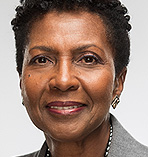Atkinson Prize in Psychological and Cognitive Sciences

To get awards news straight to your inbox, make sure to sign up for our Connect with Awards newsletter.
About the Atkinson Prize in Psychological and Cognitive Sciences
The Atkinson Prize in Psychological and Cognitive Sciences (formerly the NAS Prize in Psychological and Cognitive Sciences) is presented to honor significant advances in the psychological and cognitive sciences with important implications for formal and systematic theory in these fields. Two prizes of $100,000 are presented biennially. The prize was established by Richard C. Atkinson in 2013.
Most Recent Recipients
 |
 |
Stanislas Dehaene, NeuroSpin Center, and Vonnie C. McLoyd, University of Michigan, will each receive an Atkinson Prize in Psychological and Cognitive Sciences.
Dehaene’s groundbreaking work examines the cognitive mechanisms and brain processes of mathematics, reading, language, and consciousness. Read more about Dehaene's work»
McLoyd’s seminal work delineates how economic factors such as poverty, unemployment, and financial insecurity influence family life and adolescent development in ways that have intergenerational consequences. Read more about McLoyd's work»
Recipients:
Stanislas Dehaene (2024)
For his experimental, computational, and theoretical work on the cognitive mechanisms and brain processes of mathematics, reading, language, and consciousness––pillars of our culture and faculties that make us human.
Read more about Dehaene's work»
Vonnie C. McLoyd (2024)
For her seminal work delineating how economic factors such as poverty, unemployment, and financial insecurity influence family life and adolescent development in ways that have intergenerational consequences. And for her family process theoretical model tracing effects of racial inequities, social class, and economic hardship on parenting and adolescent social-emotional development.
Read more about McLoyd's work»
Mahzarin Rustum Banaji (2022)
For her pioneering work in establishing and quantifying the role that unconscious processes play in governing human social actions and judgments of others.
Read more about Banaji's work»
Watch Banaji's acceptance speech»
Dan Jurafsky (2022)
For his groundbreaking contributions to computational linguistics and the sociology of language with significant applications to machine learning, artificial intelligence, and social justice.
Read more about Jurafsky's work»
Watch Jurafsky's acceptance speech»
Richard N. Aslin (2020)
For his groundbreaking innovations and seminal contributions to the field of infancy, from visual and perceptual development to early language acquisition and, most recently, to brain imaging in infants; and also for his outstanding advocacy and support for women in science.
Read more about Aslin's work»
Watch Aslin's acceptance speech»
Susan Elizabeth Carey (2020)
For her discoveries of the mechanisms by which core cognition undergoes conceptual change in childhood and over history, thereby revolutionizing our understanding of how humans construct an understanding of objects, number, living kinds, and the physical world.
Read more about Carey's work»
Watch Carey's acceptance speech»
Barbara Dosher (2018)
For her groundbreaking experimental and theoretical work using elegant computational models and novel psychophysical techniques to reveal the nature of processes controlling human memory, search, perceptual attention, and perceptual learning.
Read more about Dosher's work»
Watch Dosher's acceptance speech»
Richard M. Shiffrin (2018)
For his pioneering contributions to the empirical and theoretical investigation of short- and long-term memory, controlled and automatic attention, the co-evolution of general knowledge and event memory, and the field of cognitive science.
Read more about Shiffrin's work»
Watch Shiffrin's acceptance speech»
John R. Anderson (2016)
For foundational contributions to systematic theory and optimality analysis in cognitive and psychological science and for developing effective, theory-based cognitive tutors for education.
Read more about Anderson's work»
Watch Anderson's acceptance speech»
Read more about Dweck's work»
Watch Dweck's acceptance speech»
For seminal contributions to the empirical investigation and theoretical characterization of human perception, learning, memory, language and other basic mental processes through detailed, precise connectionist neural-network modeling.
Watch McClelland's acceptance speech»
For her groundbreaking studies of infant perception, infant representations of number, and infant knowledge of the physical and social world, as well as studies of continuity and discontinuity in ontogeny.
Watch Spelke's acceptance speech»

